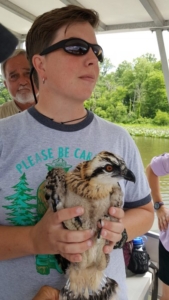Karen McDonald, the Education Program Coordinator for the Smithsonian Environmental Research Center (SERC), has been leading the front on a slew of new programming. McDonald “writes curricula, collaborates with scientists, and manages a core of about 50 volunteers who bring hands-on science to people of all ages in the community,” according to an article from the Torch that she was recently featured in. McDonald has been working on new public engagement initiatives to help get students and teachers involved in science.

Karen McDonald, Education Program Coordinator for the Smithsonian Environmental Research Center, holds an osprey during a recent banding trip on the Patuxent River in Maryland. (Photo courtesy Karen McDonald)
The team is working to hire a new Education staff member that will work alongside a current team member in Citizen Science to develop stronger public engagement programming. Alison Cawood, the current Citizen Science team member, was recently awarded a Youth Access Grant (YAG) that is an extension of the Urban Ecology Engagement Initiative, which is a collaboration between the student residents of the Anacostia Watershed, their public school teachers, local non-profit organizations, the North American Orchid Conservation Center, and SERC. They will be engaging students in Florida and DC in citizen science, and growing orchids, to determine best practices to cultivate native orchids.
This fall, they will be updating their field trip program by refocusing a 3rd-8th grade program to just 3rd-5th graders focused on a “Shorelines Connections” project. Then, 6th-12th graders will focus on stations that mirror the collection techniques, science, and practices of the MarineGeo laboratories at SERC and around the world.
McDonald was also recently awarded a small planning and implementation grant from the Society for Science & the Public for developing a teacher professional development workshop, which they hope to use as the foundation for a teacher’s academy at SERC. This will be focused on 25 teachers from Washington DC and PG county, partnering with the Howard B. Owens Science Center. They will be highlighting the practices and techniques of science, using SERC science as a model, and then sharing ways to help teachers take these techniques back into their classrooms to support students in science fairs and STEM learning.
